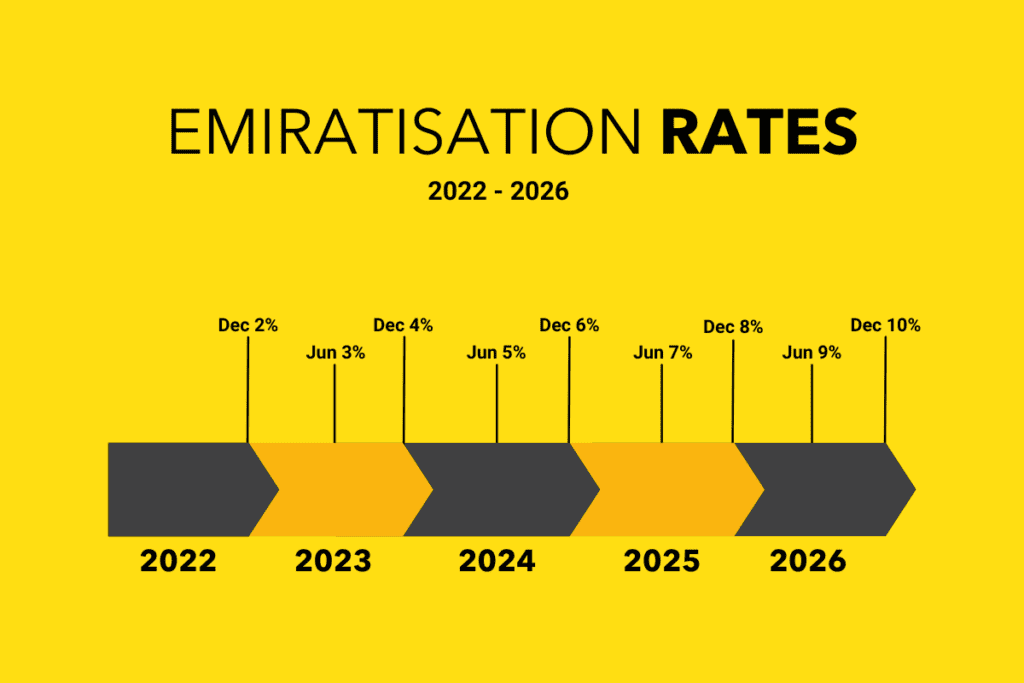Share this:
In the heart of the United Arab Emirates’ dynamic economic landscape, a transformative initiative is unfolding – Emiratization. With an unprecedented push to integrate local Emirati talent into both public and private sectors, the UAE government’s ambitious plans are reshaping the workforce dynamics of the nation.
Read the article below to find out all the most important information regarding Emiratization in 2024 and whether your company is obliged to achieve compliance with the program guidelines.
What is Emiratisation?
Historically, the UAE has heavily relied on expatriate workers, constituting 89% of the population and 92% of the workforce. This imbalance is currently particularly evident in the private sector, where Emiratis make up a mere 4% of the workforce.
According to forecasts, the UAE’s economy will constantly grow and diversify. Furthermore, depending mainly on the government for national employment is considered unsustainable. With a young and growing population, the UAE determined a pressing need for developing an economic nationalism.
Therefore, in 2022, the government initiated ambitious plans to spur economic growth through human capital development. Now, private sector companies must proactively contribute by creating additional workplace opportunities that align with this vision. The UAE admits that strategic investment in future skills is imperative to prepare young Emiratis for the evolving job landscape.
Emiratisation Targets
Companies need to ensure that 4% of their skilled workforce comprises Emiratis by 2023. Accordingly, private employers’ Emiratisation efforts must include attracting local talent and retaining and nurturing it as competition intensifies.
Private companies not located in the free zones, with 50 or more skilled employees, must increase the number of Emirati employees in skilled jobs. Therefore, they need to meet a 1% increase every six months and achieve a 2% Emiratisation rate by the end of the year.
The ultimate goal is to achieve at least a 10% increase in Emiratisation of the skilled workforce by 2026.
Find more details of the expansion of Emiratisation targets in the Ministerial Resolution.

Penalties for Failing to Meet the Requirements
Specific quotas for different sectors have been established to enforce compliance, accompanied by fines for companies failing to meet the prescribed Emiratisation quotas. Violations include reducing the number of employees or modifying their classification to circumvent the targets.
What exactly are the penalties for not following the rules?
Fines:
- Companies failing to meet the Emiratisation targets for the first time will face a fine of AED 100,000.
- Violating the Emiratisation targets 2 years straight will cause an increase in penalty to AED 300,000.
- The penalty will be higher—to AED 500,000—for the third or subsequent violation of the Emiratisation targets.
Emiratisation of the Healthcare
As of today, Emiratisation requirements apply to companies operating in 14 sectors, including healthcare and social work activities. However, the Nafis targets fluctuate in healthcare, as different emirates have varying Emiratisation objectives. For example, the healthcare industry in Abu Dhabi has recently been given a new Emiratisation target of employing 5,000 UAE citizens by the end of 2025.
In a step to empower national competencies, the Department of Health – Abu Dhabi, has set Emiratisation targets “Tawteen” for all healthcare facilities operating in #AbuDhabi to provide 5,000 new job opportunities for UAE nationals until the end of the year 2025. pic.twitter.com/C8mlsth8xI
— دائرة الصحة – أبوظبي (@DoHSocial) July 10, 2023
What Are The New Requirements of The Emiratisation Law for 2024?
Recent regulations, announced in November 2023 by the UAE’s Ministry of Human Resources and Emiratisation, bring the changes for smaller companies. Private companies with 20 to 49 employees have to hire one Emirati national in 2024 and another in 2025. Otherwise, they will face fines. This move is estimated to create around 12,000 jobs annually for UAE nationals in various economic sectors, with the Life Sciences Industry on the forehead. Additionally, larger companies with 50 or more employees must achieve a 2% Emiratisation growth in skilled jobs.
The selected companies must adhere to specific criteria, and starting in January 2025, those failing to meet the requirements of the Emiratisation law will face yearly financial contributions. Penalties will amount to AED96,000 ($26,100) per UAE citizen not hired.
The changes also bring in three categories for covered employers based on their Emiratization level:
- Tier 1: Compliant employers meeting Labor Law and Emiratisation requirements, achieving a high Emiratisation level, or using the NAFIS portal for hiring and training citizens. Companies in this tier benefit from favorable treatment.
- Tier 2: Employers compliant with emiratisation requirements. Companies in this tier will benefit from reduced work permit fees.
- Tier 3: Employers who are not compliant with the federal Labour Law and the Emiratization requirements for 2 years. Employers in this tier are subject to fines, increased work permit fees, and possible permit suspensions or refusals.

NAFIS & NAFIS Award
A national initiative emiratisation platform called NAFIS is designed to enhance the competitiveness of the Emirati workforce in the job market, specifically in the private sector.
NAFIS includes reforms, financial incentives, and other governmental benefits that encourage companies to participate in the award. This drives work opportunities for both young and experienced Emiratis in the private sector. Find out more about the NAFIS platform here.
Nafis Award, launched in 2022-2023, aims to honor top private sector companies’ contributions to Emiratisation and recognizes outstanding Emirati talents. Aligned with the UAE government’s vision, the award motivates private enterprises to increase Emirati workforce participation, fostering national economic development.
How to meet the Emiratisation requirements and find skilled workers?
Businesses need to assess their Emiratisation status and determine their tier continuously. Additionally, it is important to align strategies for workforce diversification, organizational efficiency, and Emiratisation target compliance.
HR departments should establish a procedure to hire more UAE nationals by 2026. Furthermore, Employers must fulfill obligations when hiring Emiratis, such as obtaining a work permit, contributing to a pension and social security, and finally complying with employment regulations (wages and contracts).
If you are a business in the UAE looking to hire motivated Emirati talent, please get in touch with us to learn how we can support you.